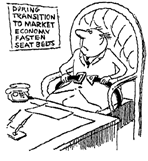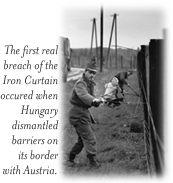Money
Matters, an IMF Exhibit -- The Importance of Global Cooperation
|
Debt
and Transition (1981-1989)
|
Part
7 of 7
|
|
|
|
| |
Thaw
in the East
|
| <--Previous
|
Globalization
and Integration |
| |
|
With
remarkable speed and surprisingly little violence, the Iron Curtain
fell in 1989, radically changing the political and economic conditions
that had been in place in Europe since World War II.
For years, Communist countries had been plagued by stagnant economies,
low productivity, inefficient industry, and constant shortages of
consumer goods. One by one, the Communist regimes of Eastern Europe
collapsed in 1989. Was this the end of the centrally
planned economies?
|
1989
Year of Anti-Communist Revolutions
|
|
In
April, Poland’s Communist government legalized the Solidarity
party. After elections in June, the Polish Communist party became
the first to allow itself to be turned out of office. Nobel Prize
winner and Solidarity leader Lech Walesa later became the first
freely elected president.
In November, massive demonstrations by almost a million Czech citizens
culminated in democratic reforms and the resignation of the country's
Communist leaders. Dissident liberal playwright Václav Havel
became president after free elections were held at the end of December.
The first real breach of the Iron Curtain occurred in May, when
Hungary dismantled barriers on its border with Austria. In October,
the Hungarian Communist party dissolved, after instituting democratic
and economic reforms.
|

credits |
|

credits
|
On November 9th, East Germany opened its borders and dismantled
the Berlin Wall. Over the next month, 133,000 people moved west.
To stem the flow, West Germany issued a plan on November 28
for Germany’s reunification. After economic union took
place in July 1990, East Germany ceased to exist.
On November 10th, after over 35 years in power, Todor Zhivkov
was forced to resign his positions as Bulgaria’s head of
state and Communist party leader. Shortly afterwards, protesters
obtained democratic reforms, including free elections and the
repeal of the Communist party’s monopoly of power.
|
|
| |
|
| <--Previous
|
Globalization
and Integration |
|